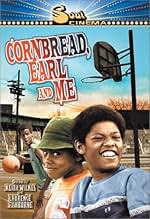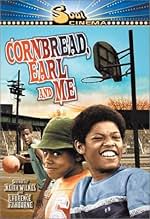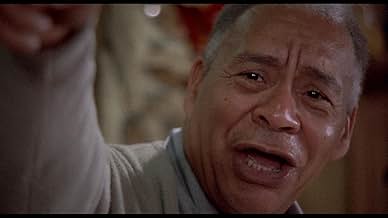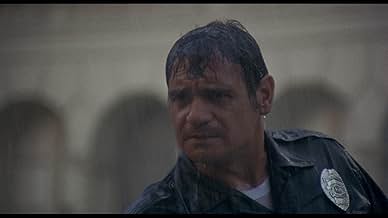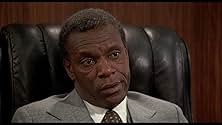VALUTAZIONE IMDb
6,9/10
1136
LA TUA VALUTAZIONE
Aggiungi una trama nella tua linguaA 12-year-old is traumatised by the murder of his friend, a star basketball player.A 12-year-old is traumatised by the murder of his friend, a star basketball player.A 12-year-old is traumatised by the murder of his friend, a star basketball player.
- Regia
- Sceneggiatura
- Star
Jamaal Wilkes
- Nathaniel 'Cornbread' Hamilton
- (as Keith Wilkes)
Laurence Fishburne
- Wilford Robinson
- (as Laurence Fishburne III)
Recensioni in evidenza
Intermittently powerful, all-too-familiar social-problem realism and maudlin melodrama, "Cornbread, Earl and Me" is, either way, a melancholic affair. The overwrought histrionics, overly-optimistic resolution, and some poor acting are especially unfortunate given how moving the best scenes are here. The rainy killing by policemen and subsequent attack on those murderous officers by the neighborhood is a strong scene--ever more shockingly so as it comes after a dull first act. Moreover, it's well foreshadowed by prior unlawful actions by the cops in harassing and unwarranted searching of suspected criminals. The subsequent intimidation of witnesses leading up to the courtroom conclusion is in way familiarly spot on, too, as the police department and city officials close ranks to obstruct justice and protect their own, but it also often veers over-the-top, as does much of the rest of the picture.
Rather surprisingly given that they cast would-be NBA Hall-of-Famer Jamaal Wilkes that the basketball scenes, or single brief montage rather, are scant and unimpressive. It seems evident he wasn't cast for his acting abilities, after all, and is in good company there with other sports legends. (Not everyone is as fortunate as Wilkes's Lakers teammate Kareem Abdul-Jabbar, to be memorably cast in "Airplane!" (1980), and some face the far more reprehensible fate of appearing in a "Space Jam" burger (1996 and 2021).) The gee-wiz simplistic saintliness of Wilkes's "Cornbread" is of eye-rolling annoyance. And, those poor neighbors putting up with his dribbling a basketball in his flat on his way to an athletic scholarship. Either that apartment building was constructed with some of the best in sound-proofing floor and walls or those neighbors are unsung heroes.
Laurence Fishburne also made his debut here, and evidently he could act even as a child, or at least it seems that way by comparison to the actress, Rosalind Cash, playing his mother, who is the most prominent offender here of some very poor, soap-opera levels of acting (and, indeed, Cash's career ended with a role on daytime soap "General Hospital"). They should've cut the candy bar theft scene that results in her ridiculously weeping over her kid stealing 15 cents worth of merchandise. I get the point of the scene--everyone gets the obvious intent of it--to establish Wilford's, the "Me" protagonist of the title, maturing sense of ethics, but there are better ways to accomplish as much without constantly hitting the audience over the head with the cinematic equivalent of a sledge hammer. Perhaps, this is a product of its era, as much of the representation of African Americans on screen was in blaxploitation flicks, so subtlety doesn't seem to have been valued much, but this material was and is still is socially-relevant and powerful enough to do without the dramatic cop-outs.
Rather surprisingly given that they cast would-be NBA Hall-of-Famer Jamaal Wilkes that the basketball scenes, or single brief montage rather, are scant and unimpressive. It seems evident he wasn't cast for his acting abilities, after all, and is in good company there with other sports legends. (Not everyone is as fortunate as Wilkes's Lakers teammate Kareem Abdul-Jabbar, to be memorably cast in "Airplane!" (1980), and some face the far more reprehensible fate of appearing in a "Space Jam" burger (1996 and 2021).) The gee-wiz simplistic saintliness of Wilkes's "Cornbread" is of eye-rolling annoyance. And, those poor neighbors putting up with his dribbling a basketball in his flat on his way to an athletic scholarship. Either that apartment building was constructed with some of the best in sound-proofing floor and walls or those neighbors are unsung heroes.
Laurence Fishburne also made his debut here, and evidently he could act even as a child, or at least it seems that way by comparison to the actress, Rosalind Cash, playing his mother, who is the most prominent offender here of some very poor, soap-opera levels of acting (and, indeed, Cash's career ended with a role on daytime soap "General Hospital"). They should've cut the candy bar theft scene that results in her ridiculously weeping over her kid stealing 15 cents worth of merchandise. I get the point of the scene--everyone gets the obvious intent of it--to establish Wilford's, the "Me" protagonist of the title, maturing sense of ethics, but there are better ways to accomplish as much without constantly hitting the audience over the head with the cinematic equivalent of a sledge hammer. Perhaps, this is a product of its era, as much of the representation of African Americans on screen was in blaxploitation flicks, so subtlety doesn't seem to have been valued much, but this material was and is still is socially-relevant and powerful enough to do without the dramatic cop-outs.
I think the label of blaxploitation for this film is quite unfair- it's heartfelt, various Black and White characters are shown as flawed rather than the "us vs. them" mentality of many racially charged films of that era- and you deeply care about what happens to everyone involved. Plus Moses Gunn is as fine an actor as ever set foot on the silver screen. Just thoroughly enjoyed it in spite of low budget feel and some clichéd moments. I even got choked up at times. Well worth seeing. Additionally, I was quite saddened to find that so many of the cast died relatively young. For a film from the mid 70s, there's an awful lot of actors in this movie no longer with us.
Jamaal Wilkes, Laurence Fishburne (in his first big-screen role), and Tierre Turner are shooting hoops when it begins to rain. They go into Charles Lampkin's store, and Wilkes buys treats for the other boys. He's in a good mood, because he's the first in the neighborhood who will go to college, on a football scholarship, and he will be going tomorrow. They start to banter about how fast he is, and he starts to run home in the rain. Police officers, pursuing a suspect, mistake Wilkes. They shoot him dead.
It's Moses Gunn whom Madge Sinclair and Stack Pierce, Wilkes' parent hire to get the Police admit they made a mistake, and it's Rosalind Cash, Fishburne's mother, who nurtures him. Some of the roles, like Stefan Gierasch as the cop who intimidates witnesses, are pretty much stereotypes, but that's the point of this movie: to see the Black people in it as individuals. Despite an occasionally clunky pacing, it does that very well.
It's Moses Gunn whom Madge Sinclair and Stack Pierce, Wilkes' parent hire to get the Police admit they made a mistake, and it's Rosalind Cash, Fishburne's mother, who nurtures him. Some of the roles, like Stefan Gierasch as the cop who intimidates witnesses, are pretty much stereotypes, but that's the point of this movie: to see the Black people in it as individuals. Despite an occasionally clunky pacing, it does that very well.
Seeing that this is one of the first, if not the first, Hollywood movies fully to address the issue of police brutality toward African Americans, a problem that remains unsolved, I am inclined to cut this film a whole lot of slack. I am willing to overlook the Lorraine Hansbury wannabe dialogue and over the top acting, surprising for such a distinguished cast. I will even forgive the bombastic, intrusive music score. Because, however crudely at times, director Joe Manduke conveys the feel of a community oppressed as well as the difficulty of and need to stand up to the oppressor. So that by the end of the film one is both angered and stirred. And not spuriously, either Give it a B minus.
PS...One exception to the general histrionics of the acting is a very young Laurence Fishburne whose testimony at the inquest is, by far, the film's best scene. That it is also the only one without music is not, in my view, coincidental.
PS...One exception to the general histrionics of the acting is a very young Laurence Fishburne whose testimony at the inquest is, by far, the film's best scene. That it is also the only one without music is not, in my view, coincidental.
I'm not going to summarize the story of this movie; you can find that above.
Rather, I'll just leave my comments on the experience of watching it.
The ;movie is well acted throughout. And that can, at times, make it difficult to watch. When one of the characters is killed, it is difficult to watch his mother's at first unbelieving reaction to the tragedy. You feel something of her grief just in watching the contorsions of her face and body. It's not easy to watch.
Later, watching the police dept intimidate witnesses to avoid a wrongful homicide verdict is also difficult to watch, but in a different sense. You see how powerless the people in this poor neighborhood are to fight back against such administrative corruption. (I also suppose it doesn't make a lot of sense. I would imagine, though I don't know this as a fact, that even in 1975 police depts would have been insured against such expenses.)
It's refreshing that it is a Black lawyer who wins this suit, and not some Great White Savior.
But at the end, you have no assurance that the same thing won't happen again. And again. And again. The shooting of the young Black man was not directly an act of racism - one of the policemen who shot at him was Black himself, and they had been told the rapist they were pursuing was Black. His death is, rather, the result of sloppy procedure and very bad coincidence.
But the intimidation of the potential witnesses by police dept reps suggests that the people in this neighborhood and other poor ones like it have little access to real justice.
Rather, I'll just leave my comments on the experience of watching it.
The ;movie is well acted throughout. And that can, at times, make it difficult to watch. When one of the characters is killed, it is difficult to watch his mother's at first unbelieving reaction to the tragedy. You feel something of her grief just in watching the contorsions of her face and body. It's not easy to watch.
Later, watching the police dept intimidate witnesses to avoid a wrongful homicide verdict is also difficult to watch, but in a different sense. You see how powerless the people in this poor neighborhood are to fight back against such administrative corruption. (I also suppose it doesn't make a lot of sense. I would imagine, though I don't know this as a fact, that even in 1975 police depts would have been insured against such expenses.)
It's refreshing that it is a Black lawyer who wins this suit, and not some Great White Savior.
But at the end, you have no assurance that the same thing won't happen again. And again. And again. The shooting of the young Black man was not directly an act of racism - one of the policemen who shot at him was Black himself, and they had been told the rapist they were pursuing was Black. His death is, rather, the result of sloppy procedure and very bad coincidence.
But the intimidation of the potential witnesses by police dept reps suggests that the people in this neighborhood and other poor ones like it have little access to real justice.
Lo sapevi?
- QuizLaurence Fishburne's film debut. He is credited as Laurence Fishburne III.
- BlooperWhen a clay pot is thrown at Officer Atkins and hits the windshield of his cruiser, it breaks. Pieces of glass hit Atkins and embed in his face. But windshields are made of safety glass and though windshields break, they keep the glass in place. So, the glass in this windshield would NOT have flown at Atkins, let alone embed in his face. He would have come out of this situation shaken but physically unharmed.
- Citazioni
Wilford Robinson: ...they killed Cornbread and he wasn't doin' nothin'
[pause]
Wilford Robinson: all he was doin wuz jus goin' home...
- ConnessioniFeatured in Dusk to Dawn Drive-In Trash-o-Rama Show Vol. 2 (1996)
I più visti
Accedi per valutare e creare un elenco di titoli salvati per ottenere consigli personalizzati
- How long is Cornbread, Earl and Me?Powered by Alexa
Dettagli
- Data di uscita
- Paese di origine
- Sito ufficiale
- Lingua
- Celebre anche come
- Hit the Open Man
- Luoghi delle riprese
- Aziende produttrici
- Vedi altri crediti dell’azienda su IMDbPro
Botteghino
- Budget
- 800.000 USD (previsto)
Contribuisci a questa pagina
Suggerisci una modifica o aggiungi i contenuti mancanti


